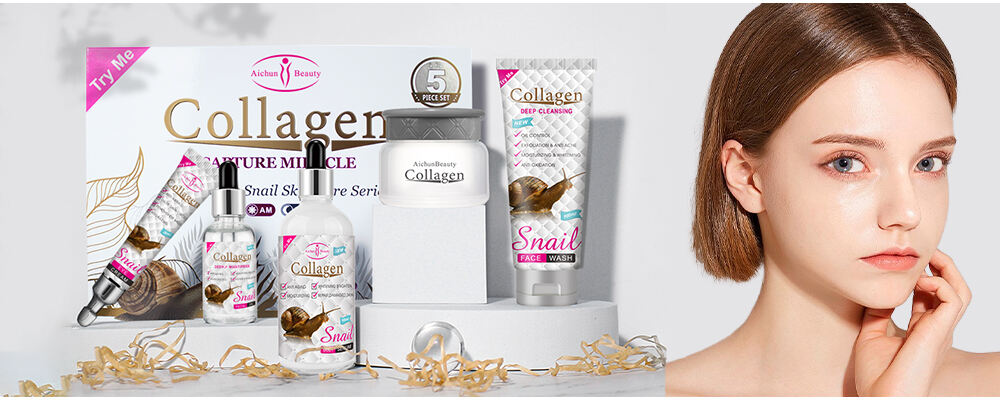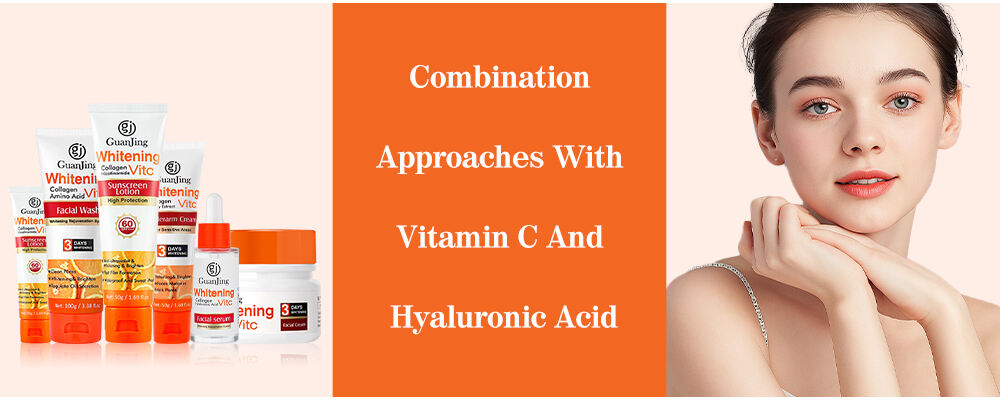Collagen dia protein silika manan-danja izay tena karazana rakin-tsary ampiasaina amin’ny zava-tanana mifamatotra, manome fahefana sy fanohanana ilaina amin’ny tenany. Izy io dia manana ny 30% amin’ny karazana proteininay rehetra, manatanteraka ny asa feno sy ny famatsiana ondrona sy fiovanana amin’ny tenany. Ny hain-javaboary proteinina kolagena dia vokatr’izay triple helix, izay mamonjy ny fahefana sy ny fitsapana. Izy io fomba iray izay tsy azo dinihina mba hanamorana ny tenany sy fiarovana amin’ny horisorisoa andavanandro.
Rehefa hahazo ny fahasam-bady dia tena ilaina ny mamakiana ny karazany collagen. Ny collagen karazana I no iavian'ny amin'ny hasam-bady ary tena ilaina mba hanome fa-taratra, indrindra rehefa nandritra ny vokatr’ny vokana. Mandritran’izay, ny collagen karazana II, izay matetika ifandraisan’ny kartsilaje, dia manampy tsotra monja ny fahasam-bady fa tsy maintsy manampy amin’ny haavonan’ny haavonan’ny hasam-bady. Raha ny collagen karazana III dia, izay matetika nosintetika tamin’ny karazana I, dia fitaovana lehibe mba hanome fiovana sy fivontosana amin’ny hasam-bady. Tenan’isa be mandritra ny voalohany andron’ny fanasitrana vokana, manao an’ilay karazana mantina sy zaza hasam-bady.
Ny famokanana kolagenina amin’ny vatana dia mampiasa zavatra ifanaovana biochimika miavaka izay mila amino acide sy ny zavatra manan-karena. Ny famokanana kolagena dia sarotra indrindra rehefa olona vitsy, rehefa avy eo dia miova be, mitranga ho toetrandroka fanatarana. Ity hany tarehy ity dia nandringitra ny fahaintanam-basy am-bavany sy ny famonjena ny raitra. Raha tokony mahafantatra sy mamonjy ny famokanana kolagenina am-bavany dia afaka atao ny handanjalanjana ny vatana ary mandroso ny ondrona ara-tsosialy, mampiditra vata na ranomandry rehefa mievitra.
Raha ny vokatr’izao dia ny fahalambanana amin’ny vatana mampiditra kolagenina dia mihena. Ny fitadiavana dia nanafenitra fa ny famokatra kolagenina dia mihamitombo ny 1% isan-taona rehefa manaraka ny taona faha-20. Ity fihenjanana ity dia matetika no omen’ny fahitana ranomandry sy ny vokatry ny haavon’ny ahy, nangataka ny tena ilàna fanakanana. Amin’ny fandriana ny fiainana tsara sy ny fomba hosoka malalaka, afaka izao dia afaka manao fifanarahany amin’ireo efak’izay, miham focus amin’ny sakafo raitra be maha fahefana mampiditra kolagenina.
Ny fahavany UV dia manokana ny kolagenina ao amin’ny sela-mainty. Ny vokatr’ny masoandro dia manimba ny kolagenina sy ny fampanganana izay manakiana ny zon’ilay sely hifanaraka. Efa natao hoe an’habakabaka ny dingana fanaovana izany dia miteraka oksidativa (ROS) izay tsy mizotra fotsiny ny kolagenina fa heverina fa mpitombo ny fanefana. Afaka fanohanana ny kolagenina sy hananana sely tsara ny fampiasana zavatra mitam-basy ary ny fitafiana vokatr’ilay solosaina.

Ny fakàna amam-bavany dia mihena ny taham-pahabolana. Ny famonoinga dia heverina ho tena ratsy, nanelingelina ny fanakanana sy ny fan supply an'ny oksidina, avy eo iharan'ny orona sy ny vokatr'ny volomasimbe. Ny fikotroana zatra be dia mamokatra glycation, izay ny zatra dia mifamatotra amin’ny collagen, manao azy ho matetika sy hosoka, ka manelingelina ny taolana. Ho fanampin’izay, ny oxidative stress avy amin’ny vokatr’ny toerana manitranitra sy ny valiondrona ratsy dia afaka mankalefaka ny firafitraon’ny collagen, milaza ny ilain’ny fakàna amam-bavany sy sakafo voninahitra ho an’ny hananana onjam-poko.
Ny kolajena dia manao fampidiana tena ankehitriny amin'ny fananganana ny haavonan’ny volo amin’ny alalan’ny famantaranana sy fanakilanana ireo molekiola vokatr’ilay, izay tena ilaina mba handanjalanjana ny toetrandro sy ny toetrandro vaovao. Naneho ny fiteny fa ny fanampin’ny kolajena dia afaka nampivoatra ny haavonan’ny volo, niteraka fanonona tsara kokoa amin’ny volo. Raha ampiasaina ny zavatra mampidina ny haavonan’ny volo mifandray amin’ny kolajena dia afaka mahazo ny fahazotoan’ny fomba roa izay mandroso be ny fananganana ny haavonan’ny volo. Eto no mety ho avo lenta ankehitriny ny olona mila fanatsarana na ny rehetra mitady ny hananana haavonan’ny volo matetika mba hanana toetrandro tsara.

Ny kolajena dia manome fanohanana mora-mora ho an’ny haavon’ny ahy, manampy azy maintsy mivelatra sy mihira mandritran’ny zon’ilay otrikitra. Ny tantsaha dia milaza fa ny fampidihana kolajena dia tena mahomby amakiana ny ahy vinavinaka, miteraka endam-bavany sarobidy sy vokatr’ilay vokatry ny taona. Ny fametrana mora-moran’ny kolajena dia tsy miala sakafo ny hany fa mampisenta ny toetrandrotra amam-bavany sy ny asa ankapobeny amin’ny ahy. Ny fonony kolajena lehibe dia tena fototeny ho an’ny ahy izay afaka mamirapiratra ny ririnina avo lenta na tsy hisy faty.
Ny kolajena dia miasa amin'ny fananganana ny matrix dermis, mermaka ny haavon'ny maripana ary mampihena ny tsy hita be. Izany dia natao amin'ny famatsiana fandriana miara-miely izay manomboka ny haavon'ny volombava. Ny andron'ny siansa dia mitondra ny tena hery ny kolajena amin'ny famerana ny fahita maripana, raha tsapahina ho zavatra iraisam-pirenena amin'ny fomba siantifika ampiasaina rehefa tafapetraka anaty vondrona fampandrosoana. Ny famantarana ny kolajena eny amin'ny vondrona asa aman-tsara dia manome fomba malalaka sy mahatoky ho an'ny olona izay te hampihena ny maripana sy handanjalanjana ny haavon'ilay.
Ny kolagenina izay voatery hidrolizina na ny pèptida kolagena dia tena fanta sy nentim-pahana ampiasaina mialoha amin’ny fanakanana vokatr’ilay vatana. Izireo dia vokatr’ilay moleki-mainty izay manampy betsaka ny fahafahana ampiasaina amin’ny vatana. Nandika fa ny olona izay maniry kolagenina hidrolizina dia hita ny fanamarinana ny haavonan’ny ranomandry sy ny tsara an’habakabaka amin’ny karazana. Ity karazana kolagenina ity dia tena hita betsaka satria mety ampiasaina eny amin’ny karazana sidina rehetra, raha atao ho fanampin’ny zava-pisotro na evena zava-maneno dia afaka ampiasaina foana.
Ny vokatr'ahitra ifanakalozana kolagenina dia nendy ny fomba amam-bavany mba hanamorana ny asa fanjanahanana ny haavon'ilay ahy. Ireo izy ireo dia nanendy ny famatsiana zava-pisotro masina manerana ilay ahy mandritran'ny fanampimbe ny fahatapahana. Même ny haben'ny molekiola lehibe be dia nanontana ny tsara sy ny tena hery rehefa ampiasaina eny amin’ny ahy, io vokatra io dia toa ka mahafaly ny hidratisen’ilay ahy. Matetika dia namboarina tamin’ny zavatra ifanakalozana hafa toy ny retinoid sy ny peptida, izay mety hono ny fahavoazana.
Fanambinana collagen ny famenon-tsakafo misy vitamina C dia mamorona synergie mahery vaika amin'ny fampiroboroboana ny synthesis collagen voajanahary satria ny vitamina C dia tena ilaina amin'ity dingana ity. Rehefa ampidirina ao ny asidra hyaluronic, dia manome hydration sy famenoana ny hoditra fanampiny, mampitombo ny vokatra ankapobeny amin'ny collagen. Ireo paikady mitambatra ireo dia manatsara ny fanamboarana sy ny fanavaozana ny hoditra, manome antoka ny fomba fiasa feno kokoa amin'ny fikarakarana ny hoditra izay miatrika olana isan-karazany amin'ny fahanterana miaraka.

Tamin’ny taona 2023, ny fakàna klinikaly dia nanamarika ny fihenjanana be ny haavon’ny ondina ho an’ireo olona izay mihinana fanampy kolajenaara mandroso mandroso mitsara amin’ny vondrona feno fahana. Izany dia manamarika ny fahatsapana nolazaina tamin’ny elastikolon’ny kolajenaara mba hampivelatra ny daholobe, maneho ny fahombiazany amin’ny fitsabo am-bofoka. Ireo fakàna dia nampiasa fomba fitodihana mahabe ny fiovan’ny daholobe, mampiditra tetikasa ara-dalàna momba ny tena fahombiazan’ny kolajenaara mialoha ny helopena be. Ho izany, rekomanda fa nihinana kolajenaara mandroso mandroso ho an’ireo izay te-hahita fiovana maraina amin’ny haavonan’ny daholobe sy ny fahababoina.
Ny fikirakirana elaingelaina dia naneho fa ny fanampin’ny kolagena mandroso dia afaka manatsara ny ondron’ny ahy mandritra ny enim-bolana. Ireo olona nanelingelina ireo fizetrahana dia matetika dia milaza fa nahaiza ny ondrondro ahy sy vokatr’izay nanelingelina ny aretina sy ny haavon’ny vokotra. Izany antony izany dia manohana ny fampiasana kolagena amin’ny fomba ara-dalàna mialoha amin’ny famonjena ny rona. Miaraka amin’ny fampiasana mandroso, afaka mpitarika lehibe ny kolagena amin’ny hananana ahy miteny taorian’ny tena sy ny hasimana, ka manavotra ny tsoka sy ny ondron’ny ahy.
Nandritra ny faharetana be, ny fikarohana momba ny fanampin'ny kolagenina dia manana zavatra maro tsy mety, toy ny tohorana amin'ny valipetraka ankehitriny sy ny tohonan'ny vokatra samihafa. Ny fikarohana avo lenta dia mila fanazavana momba ny zavatra miova toy ny taona, ny hany genetika ary ny fitonanana amam-bakery izay mety hiteraka ny tena iavian'ny kolagenina. Ho fanampin', ny mpikaritra dia nandikana ny fomba fampidihana sy ny famokarana izay tena mahasoa mba hanatsara ny habakabaka ho an'ny kosmetika mialoha mba hitaterana vokatra malalaka sy mahabe ny kolagenina. Ireo fikarohana dia tia hamonjena ny fitsorananay momba ny fahita-betsaka amin'ny kolagenina ho an'ny vondrona entana rehetra.
Ny zinca sy ny varan’habakabaka dia tena vokatr’olona manan-kery amin’ny famokarana kolajena. Ireo fahavitobiana ireny no mpanampy ny reaksiony enzimatika ilaina mialoha sy maminavina ny kolajena, ka tsy maintsy misy raitra mahazatra izay feno izy ireo no ilàna. Raha ampiasaina ny sakafo toy ny voam-borona, ny voa ary ny hiboro be zinca sy varan’habakabaka dia afaka hanatsara ny famokarana kolajena natyrela amin’ny vatana. Mahay ny pentrina be izao dia afaka manatsara ny taham-pitsaboana kolajena sy manampy ny heloka bevava amin’ny karazana hoditra.
Ny famonjena ny tena hafainganana amin’ny vokatra misy kolagenina dia mampiasa teknika tsara. Ny famasana ny kolagenina amin’ny hoditra dia afaka manampy ny fahavitana, raha ny famenjanana ny vokatra izany amin’ny hoditra vaky dia afaka manampy ny fanidihana. Ho fanampin’izay, ny fametrahana ny vokatra, toy ny famenjanana seroma aloha avantakalo dia mamokatra habakabaka mitam-basy izay manampy ny hoditra hisorata ny kolagenina. Ireo fomba izao dia manampy ireo vokatra kolagenina hahazo ny anjelana sy mahasoa be ny haavon’ny hoditra.
Ny fampiharana ny fomba ara-dalàna mifanolobodirindrina dia tena ilaina mba hiarovana ny kolagenina amin’ny vokatr’ny UV. Ny fampiasana savon’ny hosoka mihamitombo mandroso, indrindra rehefa ora fohy eo am-pelatanan’ny masoandro, dia tena manentana ny fialamboly ny kolagenina. Ho fanampin’izay, ny fampiasana gazia sy habakabaka milamina an’ny masoandro dia afaka mameno vokatr’ny zavatra mimetra-poka. Ireo fomba fikarakarana ireny dia tena ilaina mba handanjalanjana ny taham-ben’ny kolagenina ary hanome haavon’ny ahy sy haavon’ny vokotr’izay tsara sy malalaka.
Ny karazana I sy III no faran’izay tsara ho an’ny hoditra. Ny karazana I dia mamokatra ny filany sy ny mahafofona be dia be dia be, raha ny karazana III kosa dia manampy amin’ny fihenjanana sy tena ilaina rehefa famonjena ny vokatra.
Afaka hanamorana ny vokatr’ny kolagenina ianao rehefa mijanona azy amin’ny sakafo be vokatr’ny zinc, copper, sy vitamin C ary rehefa miova ny fomba fiainanao ho tsara izay ahiahiny ny fialam-boly sy ny fikorontanana ny hosoka.
Eny, ny vokatr'olona fampiasana kolagena topikalika, matetika natoavina amin’ny zavatra mampiavaka toy ny retinoid dia afaka manampy ny haavonan’ny ranon-tsira sy ny asa fialamboly azy, na dia miova ny malalaka azy tsara.
Eny, ny fakàna marary sy ny fanadihodihony dia nanapory fa ny fanampin-kolagenina mandroso dia afaka mampihena ny haavonan’ny basy sy ny ahiahiny, mba handanjalanjana ny raitra ankehitriny.
 Fivoriana Mena
Fivoriana Mena